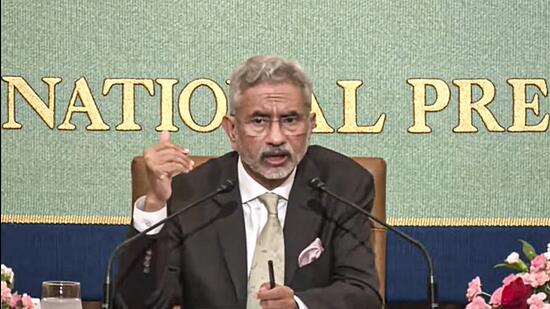Jul 29, 2024 09:50 PM IST
Jaishankar described India-China relation as ‘not good’ and ‘not normal’ because of Beijing’s decision to move large number of troops to border areas.
India will be involved in more contacts with Russia and Ukraine to find a peaceful resolution to the conflict because there aren’t many countries that are talking to both Moscow and Kyiv, external affairs minister S Jaishankar said on Monday.

Jaishankar made the remarks during an interaction at the Japan National Press Club in Tokyo, where he responded to questions on possible mediation by India between Russia and Ukraine and Prime Minister Narendra Modi’s reported plan to visit Kyiv in August.
He also described relations between India and China as “not good” and “not normal” because of Beijing’s decision to move a large number of troops to border areas in violation of existing agreements. Tensions continue between the two sides because the matter has not been fully resolved, he added.
Jaishankar reiterated India’s stated position that the Ukraine conflict has created food shortages and fertiliser supply problems, raised energy costs, and contributed to global inflation, and that a solution won’t emerge from the battlefield. From the start of the conflict, India has advocated a return to dialogue and diplomacy.
“Our feeling today is that more needs to be done, that we should not resign ourselves to the continuation of the current state of conflict…,” he said, adding that countries that are in touch with both Russia and Ukraine “should be more active”.
“I can reasonably expect that there will be more contacts between us and Ukraine and between us and Russia as well,” Jaishankar said, while declining to comment on Modi’s plan to visit Ukraine.
Reports have suggested that Modi is expected to make his first visit to Ukraine around the time of the country’s National Day on August 24. This will come weeks after his trip to Moscow during July 8-9 for the annual India-Russia Summit with President Vladimir Putin.
Jaishankar noted that Modi met Ukrainian President Volodymyr Zelenskyy on the margins of the G7 Summit in Italy in June, while he has been in touch with his counterpart Dmytro Kuleba. “We do believe today that it’s important for everybody to do whatever they can to see if in some way something improves, some move out of the battlefield into the conference table takes place,” he said.
Jaishankar acknowledged that India-China relations “are not doing very well” because Beijing moved a large number of forces to the border area in violation of agreements during the Covid-19 pandemic in 2020. This created tensions and led to a clash, and the consequences continue because the issue hasn’t been fully resolved, he said.
Relations with China “are not good, they are not normal right now”, though India hopes for a better relationship. “But that can only happen if they respect the Line of Actual Control (LAC) and if they respect agreements which they have signed in the past,” he said.
Responding to a question about reluctance among Japanese firms to establish a presence in India, Jaishankar acknowledged that bilateral business ties “could do much better”. The understanding about India among Japanese businesses is a “little dated” and this is one of the most important reasons for this trend, he said.
India, the world’s largest recipient of FDI, needs to work harder to communicate changes happening in the business environment, he said, pointing out that Suzuki wouldn’t have grown the way it did without coming to India.


